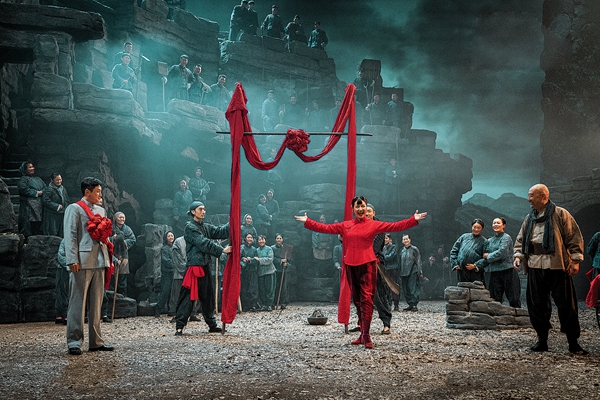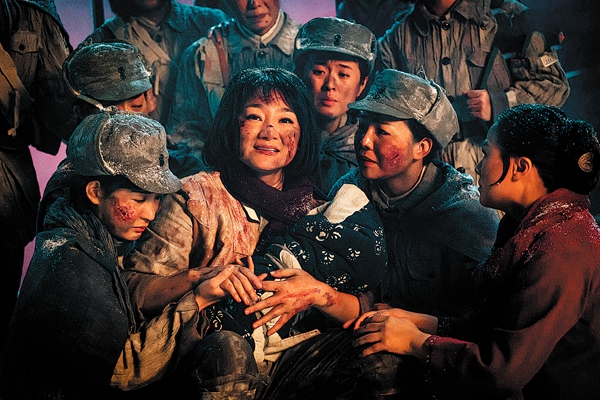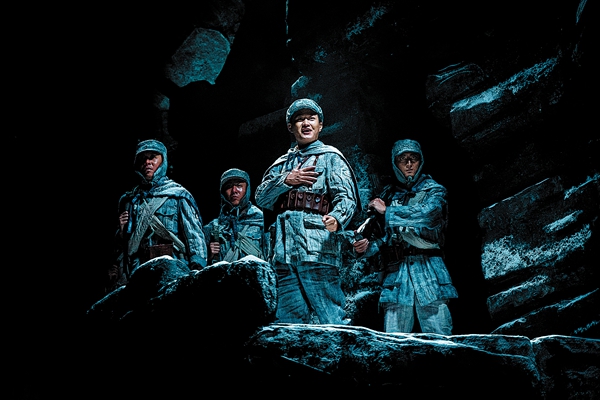
Chinese opera Yimeng Mountain has been adapted into a movie to mark the centenary of the founding of the Communist Party of China.
A film, adapted from a Chinese opera on wartime stories, debuts in theaters, Chen Nan reports.
Since its premiere in December 2018, Chinese opera Yimeng Mountain has been staged over 100 performances across the country. To mark the 100th anniversary of the founding of the Communist Party of China, the piece has been adapted into a movie that debuted at cinemas on Wednesday.
The opera, performed by the Shandong Song and Dance Theater, is based on real-life stories in the Yimeng Mountain area in Shandong province during the War of Resistance Against Japanese Aggression (1931-45). It tells of how local villagers dedicated themselves to supporting Communist troops, from making shoes and clothes for them to taking care of their children, and highlights the spirit of villagers and Chinese soldiers working together to fight the enemy.
"The stories of Yimeng Mountain are well-known among Chinese audiences," says Wang Xiaoling, the scriptwriter of the opera. "When we traveled to the area to prepare for the opera in 2018, we got a sense of the spirit of the local people. They are known for their hard work, selflessness and dedication-referred to as the 'Yimeng spirit'."
He says the stories of Yimeng Mountain have inspired many artists, who created a diversity of art forms, such as ballets and movies, to speak of the history of the place.

The opera Yimeng Mountain tells the stories of women soldiers and famous battles during the 1940s.
Composer Luan Kai spent two years working on the music for the opera. The folk songs and musical elements of Shandong have been used in his composition. For instance, Yimeng Tune, which has been used in the opera, is a well-known folk song, depicting the natural scenery of the area.
The opera portrays the stories of local women, known as the "red sisters", who took care of the wounded soldiers and even sacrificed their lives to protect them. The opera also depicts war scenes, such as the battle in Yuanziya in 1941 and the fight in Daqing Mountain in 1941.
"We've learned many stories of Yimeng Mountain, which are very old and still inspire us. They deserve to be known by the younger generations," says Wang Lida, a renowned singer, who plays the leading role, Haitang, in both the opera and movie.
Haitang, a local woman, makes friends with Communist soldiers, especially a female soldier named Xiahe. She takes care of Xiahe's daughter after the soldier is killed in war. When Haitang's husband decides to join the army, she makes him shoes and clothes despite her sorrow at his leaving.
"Haitang is an ordinary woman but does extraordinary things," says Wang Lida.

The opera Yimeng Mountain tells the stories of women soldiers and famous battles during the 1940s.
"When the opera is adapted into a movie, it's challenging for me to play the role because the expression is much more subtle."
The role won Wang Lida a number of top Chinese awards, including the Magnolia Drama Performance Award and the Plum Performance Award.
She graduated from the China Conservatory of Music with a doctoral degree in 2018 and has played leading roles in many Chinese operas. She says she is proud that the opera has been adapted into a movie, which will allow more audiences to see the real stories of the Yimeng Mountain area decades ago.
The opera has also been adapted into an orchestral version, which has been staged at Chinese universities.
According to Huang Dingshan, the director of both the opera and movie versions of Yimeng Mountain, it took the creative team over 20 days to finish shooting the movie.
With decadeslong experience in theater production and filmmaking, Huang is adept in both.
"Movie and opera are two different languages. We spent a long time working on the storyboard before shooting the movie. It's not simply recording the opera with a camera. It's a new artistic expression," says Huang.
The director says that compared to the opera, the movie version is much more romantic and poetic, accomplished by filming techniques, such as lighting and shifting scenes.

